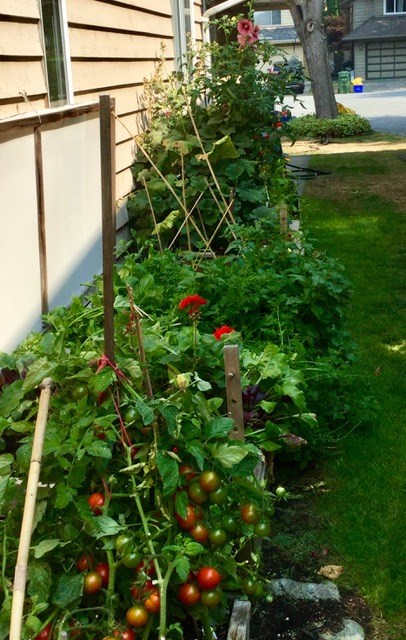A war is on in our gardens. While enjoying a lovely breakfast and gazing out our kitchen window at our beautiful garden, a very tall hollyhock started shaking. The entire plant was filled with a momma rat who was the size of a small kitten and several baby rats feasting on the seeds of the hollyhock.
Apparently yelling loudly and running at them with garden tools doesn’t keep them at bay.
We work hard in our yard keeping food waste out of our compost, removing bird feeders in the spring and harvesting our produce as quickly as possible. Who knew rats love hollyhock seeds?
Besides hollyhock seeds, rats love to eat sweet corn cobs, pumpkins, squash and various root vegetables such as carrots, parsnips, potatoes, beetroots (we lost our entire crop of beets last year to rats). These little critters also like harvested fruit such as apples.
Rats, rightfully, make us very squeamish. They are often infected with bacterial disease that can also infect humans. Bacteria is present in rats’ urine and persists in wet places. It infects people through cuts, abrasions or by ingestion.
Rats have a liking for compost heaps because they offer great burrowing opportunities. Do not use compost in your fruits and vegetables garden that has been in contact with rats.
Rats can be controlled with traps or poison baits. Traps can be baited with a range of foodstuffs such as bread, cereal or chocolate. We use peanut butter which seems to be amenable to the rat palate. Avoid placing the traps where other animals have access to them.
Rat poison must be used with care to avoid non-target animals consuming the bait. The bait should be put down until the rats stop taking it as often several meals are required before the rats are killed.
Dead rats should be disposed of quickly before other animals feed on the corpse. You can dispose of them by burying them or putting them into your green bin.
Rats can breed at a prolific rate, with females having up to five litters a year. The average litter has seven pups but as many as 14 have been recorded.
City of Richmond suggests that you call the Health Department at 604-233-3147 to report a rat problem.
So don’t be concerned when you see my husband in full camouflage gear sneaking around his precious and well-tended vegetable gardens and strawberry patches setting traps and cursing the unwanted beasts who have moved into our territory. I am not sure who is going to win this battle!
Lynda Pasacreta is the current president of the Richmond Garden Club. For more information visit richmondgardenclub.ca.



